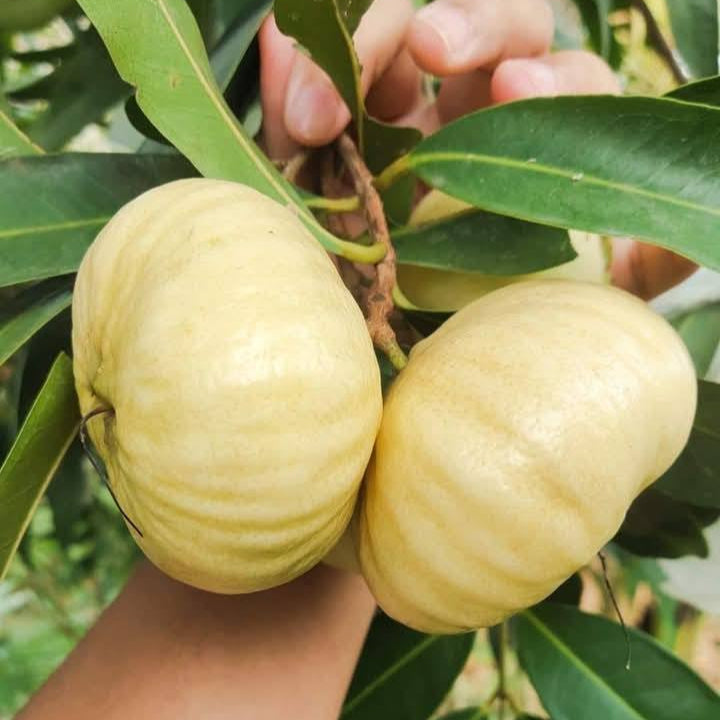Love it? Add to your wishlist
Your favorites, all in one place. Shop quickly and easily with the wishlist feature!
[message]
[title]
[message]




Veliyath Gardens
Couldn't load pickup availability
Aromatic Elegance for Your Garden: The Rose Apple (Syzygium jambos)
Common Name: Rose Apple, Jambos, Paneer Champa
Botanical Name: Syzygium jambos
An Evergreen Jewel from the East
With origins rooted in Southeast Asia and a graceful spread across tropical regions around the globe, the Rose Apple, known scientifically as Syzygium jambos, is both a visual and sensory delight. This evergreen tree, cherished for its symmetrical shape and dense canopy, has long been a favorite in both ornamental landscapes and fruit gardens. In countries like India, Sri Lanka, and the Philippines, it holds a special place—not just for its fruit, but for its gentle fragrance and traditional relevance.
The tree grows with elegance, developing wide-spreading branches and glossy green leaves that offer comforting shade. When in bloom, the tree is adorned with creamy-white flowers that resemble soft tufts, soon giving way to fragrant fruits that captivate anyone who encounters them.
Local Names and Cultural Significance
In India, it is fondly called Paneer Champa, referring to its sweet, rose-like scent. In Sri Lanka, it is known as Jambu or Jambos, and in the Philippines, it's often referred to as Makopa. Across these regions, the tree is more than just a source of fruit—it is part of local traditions, village life, and backyard stories.
Traditionally, the leaves and bark have been used in folk medicine, and the fruit is often offered to guests as a cooling treat during warmer months.
The Distinct Taste of Rose Apple
Crisp, juicy, and incredibly aromatic, the Rose Apple delivers a flavor experience unlike any other. Its name is derived from the distinct rose-water scent that fills the air upon slicing the fruit. The flesh is pale, semi-transparent, and delicately crunchy, offering a refreshing, subtly sweet taste with floral notes.
Though usually eaten raw, it lends itself beautifully to culinary creativity:
Lightly stewed for preserves
Used in jams, jellies, and sauces
Added to salads for a fragrant twist
Infused in drinks for a natural floral accent
This fruit can also be enjoyed as a mild palate cleanser, especially after spicy meals.
Nutritional and Health Benefits
Aside from its sensory pleasures, the Rose Apple is packed with natural goodness:
Rich in Vitamin C – Enhances immunity and supports healthy skin
Contains Dietary Fiber – Promotes digestion and gut health
Low in Calories – Ideal for calorie-conscious diets
Good Source of Iron and Calcium – Supports bone health and blood circulation
Natural Antioxidants – Protect the body from cellular damage
Cooling Properties – Traditionally used to reduce body heat during hot seasons
The fruit also contains small amounts of B vitamins and trace minerals, contributing to a balanced and healthy diet.
Plant Growth and Cultivation Details
Time to Fruiting: 5 to 6 years from planting
Maintenance: Moderate – occasional pruning and seasonal feeding
Growth Habit: Medium to large evergreen tree
Preferred Climate: Tropical to subtropical zones
Soil Requirements: Well-drained, fertile soil enriched with organic matter
Watering: Regular watering during dry seasons, with care to avoid waterlogging
Light Needs: Full sun to partial shade
Once established, the Rose Apple tree is fairly hardy. Pruning the tree regularly helps manage its size and encourages better fruiting. Mulching around the base of the tree helps retain soil moisture and reduce weed growth.
How to Preserve and Store
Rose apples are best enjoyed fresh due to their high moisture content and delicate skin. However, short-term storage in cool, dry conditions can extend shelf life by a couple of days. For longer use:
The fruits can be stewed and preserved in syrups
Pulp can be used in homemade jams and marmalades
Chopped and frozen for smoothies or desserts
In some traditional homes, Rose Apple flowers are even dried and used in potpourris for their lingering aroma.
Traditions, Culture, and Herbal Wisdom
In Ayurveda and traditional Asian medicine, various parts of the Syzygium jambos tree have been used for centuries. The leaves are believed to possess antimicrobial properties, while the bark and seeds are used in herbal decoctions for minor ailments. The fruit is often recommended during fever or seasonal heat to help hydrate the body and soothe internal heat.
In village customs across South India, Rose Apple trees are often planted near temples or courtyards, symbolizing peace and wellness. The tree's soft blossoms are occasionally used in cultural rituals or decorations.
Why Rose Apple Deserves a Spot in Your Garden
The Rose Apple tree brings more than just fruit—it offers fragrance, elegance, tradition, and nourishment. Its ornamental beauty is matched by the charm of its edible fruit, which appeals to children and adults alike. Easy to care for and rewarding in so many ways, this plant is ideal for those who appreciate a balance of aesthetics and utility in their garden.
Add it to your plant garden and witness how it transforms your space with both shade and scent. Whether you're planning a tropical orchard or looking for a tree that stands out, the Paneer Champa is a graceful choice that promises joy in every season.
Your Next Garden Companion from Veliyath Gardens
At Veliyath Gardens, we offer well-nurtured Rose Apple plants ready to thrive in your home or farm. With expert care in every sapling and our focus on rare and exotic species, you're not just buying a plant—you’re bringing home a piece of living heritage.
Let the aroma of Syzygium jambos linger in your home. Welcome nature’s floral sweetness and create a sensory sanctuary that nourishes, delights, and soothes—season after season.
Time to Fruiting: 5 to 6 years from planting
Maintenance: Moderate – occasional pruning and seasonal feeding
Growth Habit: Medium to large evergreen tree
Preferred Climate: Tropical to subtropical zones
Rich in Vitamin C – Enhances immunity and supports healthy skin
Contains Dietary Fiber – Promotes digestion and gut health
Low in Calories – Ideal for calorie-conscious diets
Good Source of Iron and Calcium – Supports bone health and blood circulation
The Rose Apple tree brings more than just fruit—it offers fragrance, elegance, tradition, and nourishment. Its ornamental beauty is matched by the charm of its edible fruit, which appeals to children and adults alike. Easy to care for and rewarding in so many ways, this plant is ideal for those who appreciate a balance of aesthetics and utility in their garden.





